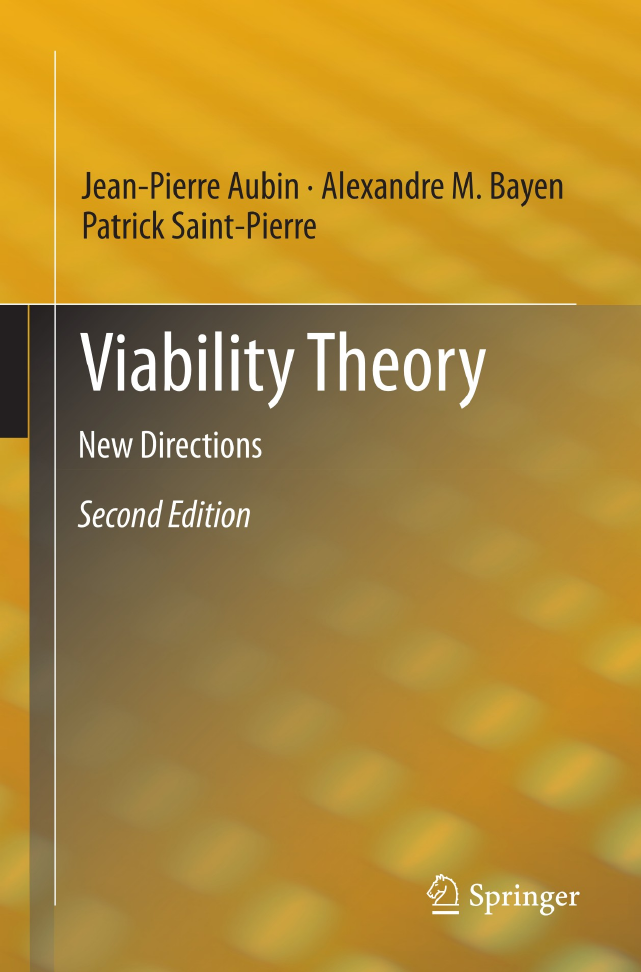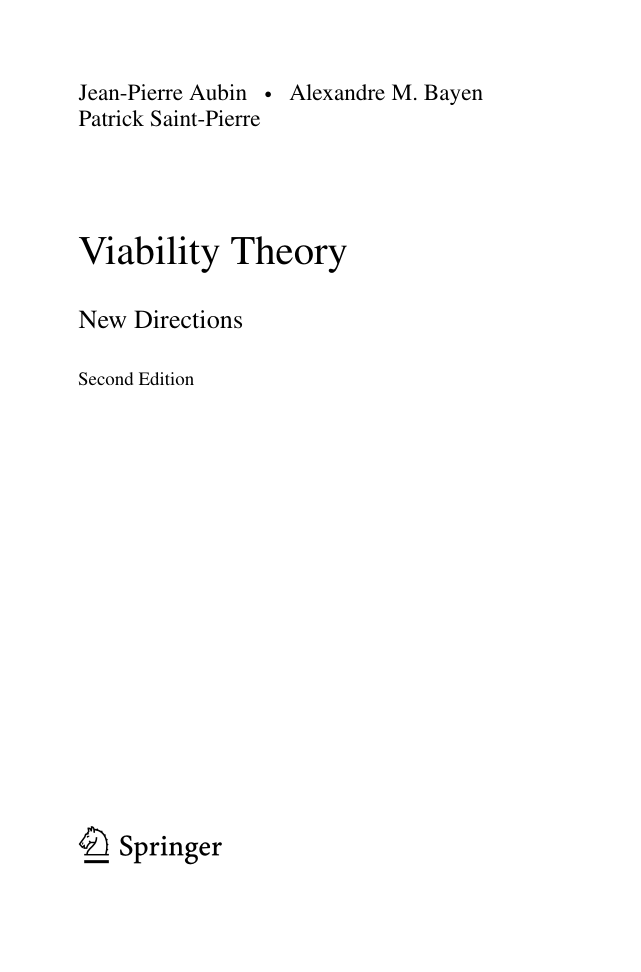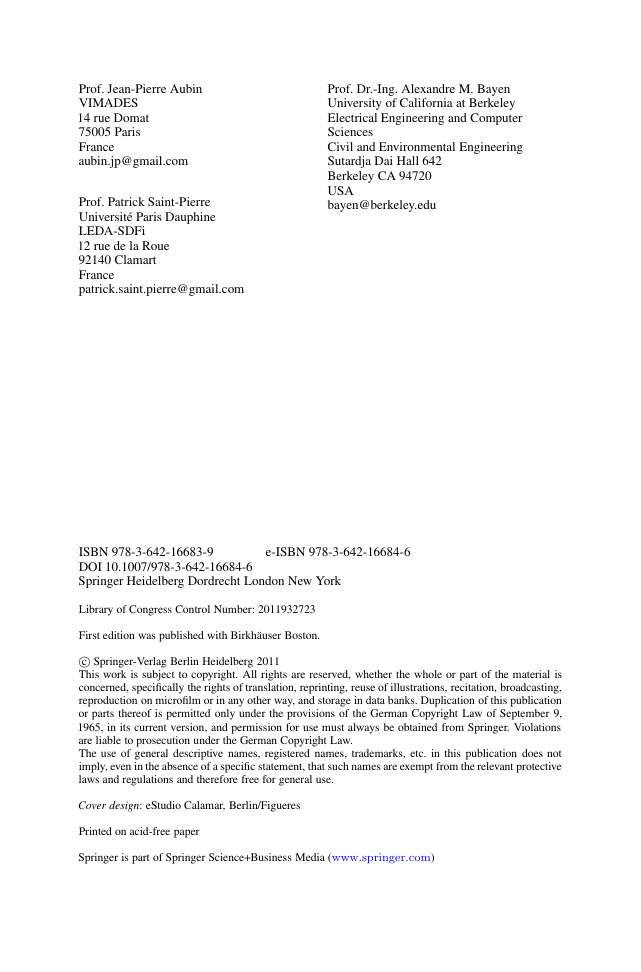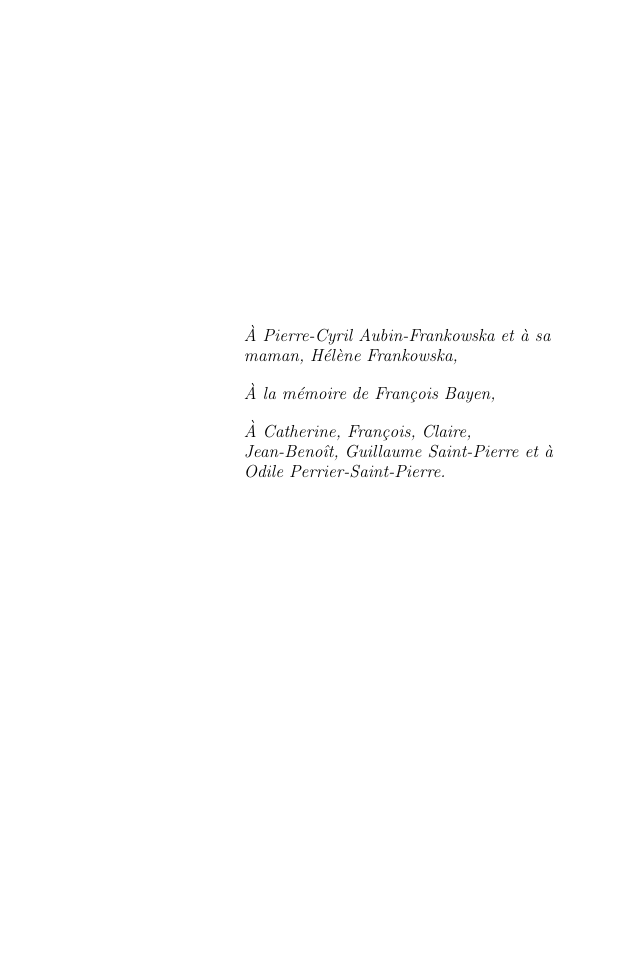�
Viability Theory
•
�
Jean-Pierre Aubin • Alexandre M. Bayen
Patrick Saint-Pierre
Viability Theory
New Directions
Second Edition
123
�
Prof. Dr.-Ing. Alexandre M. Bayen
University of California at Berkeley
Electrical Engineering and Computer
Sciences
Civil and Environmental Engineering
Sutardja Dai Hall 642
Berkeley CA 94720
USA
bayen@berkeley.edu
Prof. Jean-Pierre Aubin
VIMADES
14 rue Domat
75005 Paris
France
aubin.jp@gmail.com
Prof. Patrick Saint-Pierre
Universit´e Paris Dauphine
LEDA-SDFi
12 rue de la Roue
92140 Clamart
France
patrick.saint.pierre@gmail.com
ISBN 978-3-642-16683-9
DOI 10.1007/978-3-642-16684-6
Springer Heidelberg Dordrecht London New York
e-ISBN 978-3-642-16684-6
Library of Congress Control Number: 2011932723
First edition was published with Birkh¨auser Boston.
c Springer-Verlag Berlin Heidelberg 2011
This work is subject to copyright. All rights are reserved, whether the whole or part of the material is
concerned, specifically the rights of translation, reprinting, reuse of illustrations, recitation, broadcasting,
reproduction on microfilm or in any other way, and storage in data banks. Duplication of this publication
or parts thereof is permitted only under the provisions of the German Copyright Law of September 9,
1965, in its current version, and permission for use must always be obtained from Springer. Violations
are liable to prosecution under the German Copyright Law.
The use of general descriptive names, registered names, trademarks, etc. in this publication does not
imply, even in the absence of a specific statement, that such names are exempt from the relevant protective
laws and regulations and therefore free for general use.
Cover design: eStudio Calamar, Berlin/Figueres
Printed on acid-free paper
Springer is part of Springer Science+Business Media (www.springer.com)
�
`A Pierre-Cyril Aubin-Frankowska et `a sa
maman, H´el`ene Frankowska,
`A la m´emoire de Fran¸cois Bayen,
`A Catherine, Fran¸cois, Claire,
Jean-Benoˆıt, Guillaume Saint-Pierre et `a
Odile Perrier-Saint-Pierre.
�
•
�
Acknowledgments
The authors would like to thank H´el`ene Frankowska for her implicit and
explicit contributions to the writing of the book, as well as the members
of the “viability group” who participated to its elaboration: Anne Bru-
Gorre, Pierre Cardaliaguet, Luxi Chen, Christian Claudel, ´Eva Cr¨uck, Anya
D´esilles, Ga¨el D´esilles, Olivier Dordan, Halim Doss,
luc Doyen, Marie-
H´el`ene Durand, Alexandra Fronville, Thomas Lorenz, Sophie Martin, Juliette
Mattioli, Frank Maurin, Alberto Murillo, Laurent Najman, Dominique Pujal,
Marc Quincampoix and Nicolas Seube without forgetting Alain Haurie,
Mich`ele Breton and Georges Zaccour.
We also would like to thank Andr´e Giroux for his careful reading of the
first part of this book.
The authors want to thank Claire Tomlin, Ian Mitchell, Meeko Oishi,
Shankar Sastry, George Pappas, John Lygeros and Craig Evans for fruitful
discussions leading to the initial formulation of the landing problem and
reachability analysis. The chapter on the traffic and conservations laws
greatly benefited from fruitful conversations with Carlos Daganzo, Miroslav
Krstic, Michael Cassidy, Benedetto Piccoli, Christian Claudel, Sebastien
Blandin and Xavier Litrico.
The simulations using the software of the viability algorithms are due to
Patrick Saint-Pierre and the figures to Alexandre Bayen and Patrick Saint-
Pierre.
The experiment on the pioneer has been made by ´Eva Cr¨uck, Ga¨el
D´esilles, Benjamin Frenais de Coutard, Aur´elien Gosselin, Fabrice Leroux at
D´el´egation G´en´erale `a l’Armement (DGA). The design and implementation
of the viability algorithm used to compute the optimal trajectories of
the submarine was done by Andrew Tinka. The submarine used for the
experiments presented in this book was manufactured by the University of
Porto, by the team of Joao Sousa, who is gratefully acknowledged for enabling
field experimental tests in the United States.
The authors would like to thank Werner M¨uller for his 6-years patience as
well as Catriona Byrne and Martina Bihn for their help for publishing this
book.
vii
�
















 2023年江西萍乡中考道德与法治真题及答案.doc
2023年江西萍乡中考道德与法治真题及答案.doc 2012年重庆南川中考生物真题及答案.doc
2012年重庆南川中考生物真题及答案.doc 2013年江西师范大学地理学综合及文艺理论基础考研真题.doc
2013年江西师范大学地理学综合及文艺理论基础考研真题.doc 2020年四川甘孜小升初语文真题及答案I卷.doc
2020年四川甘孜小升初语文真题及答案I卷.doc 2020年注册岩土工程师专业基础考试真题及答案.doc
2020年注册岩土工程师专业基础考试真题及答案.doc 2023-2024学年福建省厦门市九年级上学期数学月考试题及答案.doc
2023-2024学年福建省厦门市九年级上学期数学月考试题及答案.doc 2021-2022学年辽宁省沈阳市大东区九年级上学期语文期末试题及答案.doc
2021-2022学年辽宁省沈阳市大东区九年级上学期语文期末试题及答案.doc 2022-2023学年北京东城区初三第一学期物理期末试卷及答案.doc
2022-2023学年北京东城区初三第一学期物理期末试卷及答案.doc 2018上半年江西教师资格初中地理学科知识与教学能力真题及答案.doc
2018上半年江西教师资格初中地理学科知识与教学能力真题及答案.doc 2012年河北国家公务员申论考试真题及答案-省级.doc
2012年河北国家公务员申论考试真题及答案-省级.doc 2020-2021学年江苏省扬州市江都区邵樊片九年级上学期数学第一次质量检测试题及答案.doc
2020-2021学年江苏省扬州市江都区邵樊片九年级上学期数学第一次质量检测试题及答案.doc 2022下半年黑龙江教师资格证中学综合素质真题及答案.doc
2022下半年黑龙江教师资格证中学综合素质真题及答案.doc